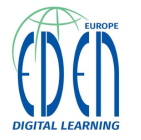Let me start with an apology. This is my first post on this president’s blog, started by EDEN president Alan Tait 16 years ago. I am sorry for not writing here to all of you earlier. I have no excuses. I can only say that since the start of my presidency in October 2021, I have worked hard, with the full support of my colleagues on the Management Board, to ensure that EDEN, after the pandemic and transfer process from the UK to the EU, returns to being the EDEN it always has been. And we have achieved this by having a fantastic EDEN conference in Dublin on 18-20 June.
“Yes, we can” was the motto of the Dublin conference, and we could confirm that EDEN is indeed working towards being “Europe’s leading network for advancing digital education” as the recently approved vision of the Strategic Plan 2023-28 states.

I want to share with you my feelings regarding the session “Major Developments from Thirty Years with EDEN” with the participation of the recent 5 EDEN Presidents: Alan Tait, Morten F. Paulsen, António Teixeira, Airina Volungeviciene and Sandra Kucina. In this session, we could observe the evolution of EDEN through its Presidents and the evolution from Distance Education to Digital Education through Online Education or e-learning in Europe.
Alan Tait was EDEN president from 2007 to 2010. During these years, online education was progressing in Europe, introducing new learning models and promoting Open Resources. Alan Tait, from the Open University (UK), shared with the audience his gratitude for his experiences as President and the vast potential that EDEN already had in those years as a European network of academics and professionals. Alan highlighted some milestones of his presidency: establishing the Fellow’s awards and the President’s blog.
In the early years of the second decade of the 21st century, online education was getting a new impetus in Europe thanks to new mobile devices and the emergence of social networks that soon impacted education. Morten F. Paulsen, from NTNU, Norway, was the president of EDEN from 2010 to 2013. Morten highlighted that the 20th EDEN anniversary was commemorated during his term, and the first EDEN social network accounts were opened. During this period, NAP intensified its activities, and EDEN members started to feel and experience EDEN as a family. Due to a significant financial crisis, this was a challenging time, but EDEN overcame the obstacles and continued its activities.
Antonio Teixeira, from Universidade Aberta in Portugal, was president of EDEN from 2013 to 2016. During this period, E-learning became increasingly common in higher education institutions, and EDEN was established as a hub of services for improving online education and its quality assurance. During his presidency, Antonio Teixeira promoted EDEN’s international alliances by creating partnerships in Europe and beyond that still exist today. Teixeira intensified EDEN’s communication policies to disseminate its activities and grow as a network.
Airina Volungeviciene, from Vytautas Magnus University, Lithuania, was EDEN’s president from 2016 to 2018. During this period, the UK’s exit from the EU, Brexit, directly affected EDEN as it was already constituted as an association in that country. Due to this, a new entity was created in Estonia, which would be the platform for transferring EDEN’s legacy to an EU-based organisation. Online Education has become well-established in Europe, and research has emerged as a significant focus for EDEN. The first PhD Symposium is held, and activities are carried out for young researchers in online education. The Fellows Council was established during this period and gathers all EDEN Fellows and Senior Fellows. The first EDEN Open Education Week was also held during this period.
Sandra Kucina became EDEN President in 2018 and for the period until 2021. The end of 2019 marks the first cases of COVID-19, and during the first months of 2020, mass lockdowns occur worldwide. The educational world shuts down, and emergency education takes place. The EDEN community reaches out to the educational world to collaborate as experts, and a series of webinars called #onlinetogheter are set up and become very successful. The annual 2020 Timisoara and 2021 Madrid conferences and the 2020 Research Workshop are held virtually. Sandra Kucina proudly mentioned during her presentation the robust reaction of EDEN to the service of the educational community. She also pointed out that during her term EDEN celebrated 30 years of EDEN and received the 2021 ICDE Prize of Excellence Award.
All the presidents highlighted the critical role played by the EDEN secretariat, composed of professionals from different countries and institutions, and the leadership of the former Secretary General, Andras Szucs. The critical involvement of EDEN members in the different executive committees was also mentioned. They played an essential role in the network’s evolution and growth.
As the current president, it was an excellent opportunity for EDEN and me to have the former presidents attend that session. I enjoyed the sessions and saw the critical role that EDEN has played in Europe over the last 30 years. It was an analytical look at the past with a view to future challenges. Digital education is our main challenge today. Thanks to the EDEN community’s potential, we are participating in European policies and strategies, such as the construction of the European Digital Education Hub.
Now we have to look to the future. And we can do this thanks to the solid and robust basis built over more than 30 years by the different individuals who have led the association. There are new challenges ahead of us, and we have defined them in our strategic project. As the current president, I know that I can count on all of you, and I assume the responsibility to walk together, as a network and as a family, in the construction of Digital Education in Europe.




